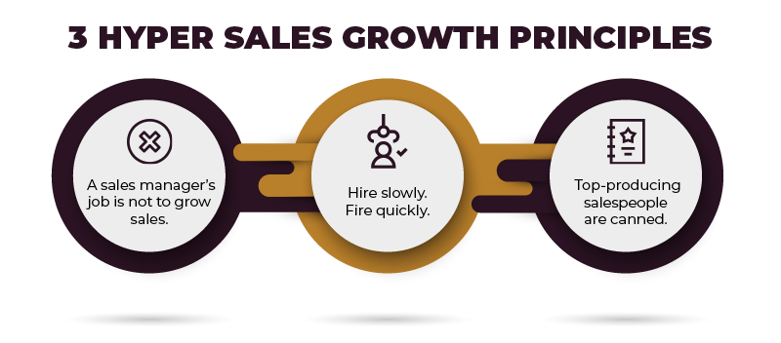Want Hyper Sales Growth? Then Don't Focus On Sales Growth


What if I told you the secret to sales growth for your business is to not focus on sales growth?
Or that you should fire people quickly?
Or that your sales approach should be canned?
If you’d say it sounds like the recipe for 15% sales growth, then you’d be right. These principles form the foundation of Hyper Sales Growth, a set of systems and processes that prepares you for success by growing your sales force’s quantity and quality.
I developed the Hyper Sales Growth method through decades of building fast-growing businesses, transforming 6 companies into national firms along the way. I’ve written 3 books about the program, and today I share its lessons by speaking to entrepreneurs, CEOs, and sales professionals all over the world.
The program asks you as a business and sales leader to embrace 3 principles:
- Not to emphasize sales growth, but to focus on salespeople
- Not to waste time working with underperforming salespeople, but to let them go
- Not to struggle with endless sales objections, but to practice responses to 10 or 15 of them
These principles are key if you want to achieve hyper sales growth. Here’s how to make them work for your business.
The Counterintuitive Approach To Grow Your Sales
I outline the Hyper Sales Growth method in my book The Sales Playbook for Hyper Sales Growth.
With this method, one of the first things you want to do is develop a Hyper Sales Growth Sales Guide that incorporates the key principles of the program. Your guide ensures that you have top-performing salespeople who are prepared for all the possible scenarios that come their way.
1. A Sales Manager’s Job Is Not To Grow Sales
This first point to note as you develop your Sales Guide is the basis of the Hyper Sales Growth program: The way to amplify sales is not to focus on sales growth. You should focus instead on growing your salespeople.
The first step in turning your attention to sales team members is to negotiate minimum standards of performance for each individual person.
There are a couple of zingers in that statement, aren’t there? First, it’s the notion of negotiating goals. And then it’s the concept of individualizing the standards. Let’s unpack each of those thoughts.
Negotiate Performance Goals
Work with people to negotiate appropriate minimum sales standards for salespeople — instead of simply assigning them. Taking this approach gives you an important motivator: buy-in. Simply put, people will fight for the goals they set.
Establish Individual Sales Standards
Companies too often draw a baseline and direct every salesperson to hit that number.
But your top performers wouldn’t bother to get out of bed for that number. Meanwhile, that same number is likely to crush your bottom salespeople, many of whom are new and don’t have a track record yet. So, craft minimum standards for each salesperson with that individual’s past performance in mind.
2. Hire Slowly. Fire Quickly
Typical sales managers spend the bulk of their time with their weakest performers. The top performers, they figure, are doing fine, so they believe they need to focus their attention on helping struggling salespeople.
But the bottom 25% of salespeople are producing less than 6% of sales in the United States, while the top 25% of salespeople are producing more than 60% of sales. The worst performers are costing their companies money. Too often they also are energy vampires whose negative impact extends not only to other salespeople but also to your company’s external image.
I often say that sports teams are run better than most businesses. What happens when athletes aren’t performing? They don’t make the cut. And the process of building a world-class organization also starts with getting out the people who don’t belong in it.
The truth is these bottom performers often know they’re not good at what they do. They’re unhappy with their jobs and unsure how long they can keep them. Until you let them go, you’re the only thing standing in the way of their finding that other thing they are good at and that brings them pleasure. Hire slowly, but fire quickly — and all parties ultimately will benefit.
3. Top-Producing Salespeople Are Canned
There’s hardly anything that goes on in a sales call that you couldn’t anticipate before you got there. So, there’s no reason not to be prepared for the opposition.
Think about how well a sports team is prepared for what the opposition will do. They’ve practiced it over and over and over again. They know when their opponent goes one way, they do this. When their opponent goes another way, they do that.
The top-producing sales people are no different. They are canned.
I don’t mean they’re fired. I mean they say the same thing the same way each time they encounter a certain situation. But these top performers' canned responses don’t sound canned — they sound to the person hearing them as though it’s the first time the salesperson has ever said them.
Think about it: There really are about 10 or 15 of the same objections a salesperson will encounter. You can find the most common objections your own company’s salespeople encounter and build the best responses to those objections, including specific benefits and differentiators. And there’s your playbook.
Your sales team should practice that playbook. Rehearse those answers. Eventually they’ll be so natural it sounds like the first time the salesperson has delivered them.
Scale Your Company With Hyper Sales Growth
The answers for skyrocketing your business’s sales are in the Hyper Sales Growth method.
But learning those principles is just the beginning. The real work comes in developing your Sales Guide and implementing its concepts — in making a commitment to work each day to put these ideas in place in your leadership mindset and in your business.
If you’re ready to discover more about Hyper Sales Growth, how it can work for your company, and the value it offers for your sales growth, I hope you’ll join me in the next cohort of the program.



